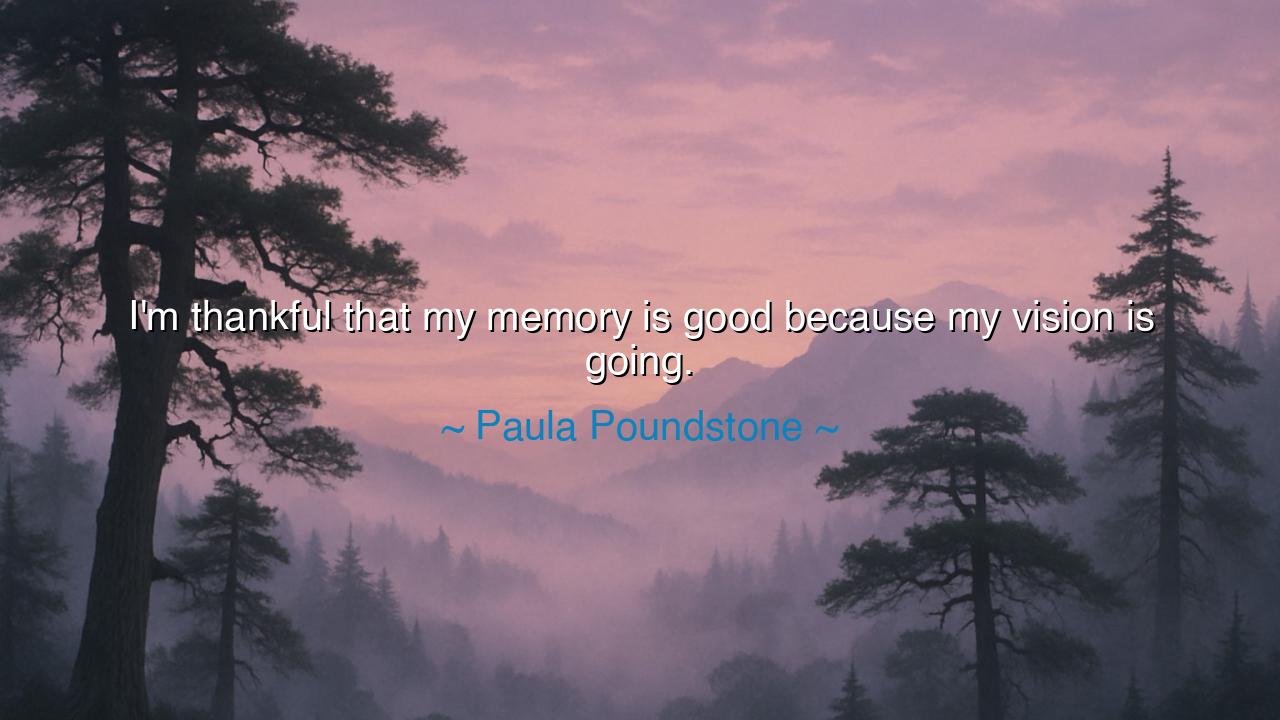
I'm thankful that my memory is good because my vision is going.






Paula Poundstone, with wit yet also with depth, once remarked: “I’m thankful that my memory is good because my vision is going.” Though spoken lightly, as is her way, these words carry an ancient weight. They remind us that when one gift begins to fade, another often rises to sustain us. Life takes, but it also gives. The eyes may dim, but the mind’s treasury of recollection can keep the world bright within. Thus, her gratitude is not merely humor—it is wisdom: the acceptance of loss with reverence for what remains.
The ancients knew well this exchange of strengths. In Homer’s Odyssey, the blind poet Demodocus sang with divine power, though sight had been denied him. His vision was gone, yet his memory and voice carried the stories of gods and heroes, echoing louder than sight ever could. So too in Poundstone’s words, the dimming of the eye is balanced by the sharpening of remembrance, for memory is itself a kind of inner sight, preserving what the fading body can no longer hold.
Her reflection is a hymn to the resilience of the human spirit. Many lament what they lose; few celebrate what they retain. By choosing to be thankful, she transforms decline into a kind of blessing. Memory becomes her lantern, illuminating the path ahead even as the outer light grows faint. This is a profound lesson for us all: gratitude shifts the heart from despair to strength, from mourning to appreciation.
History offers us many examples of this truth. Consider Helen Keller, who was both blind and deaf, yet whose memory, intellect, and indomitable spirit allowed her to master language and inspire generations. What she lost in physical sense, she gained in perception of the soul. Poundstone’s words echo the same truth in gentler form: though the eye weakens, the mind can remain a vibrant palace of recollection, filled with images, voices, and love.
The essence of her quote is balance: that in life, we are seldom left empty-handed. As time passes, the body will inevitably falter, but if we cherish what remains—be it memory, strength, voice, or love—we find ourselves not diminished but transformed. Gratitude allows us to see this balance not as cruel irony, but as the tender mercy of life, which compensates for loss with quiet gifts.
The lesson here is clear: do not despair at the failing of one faculty, but rejoice in the power of the others. When the eyes blur, listen more deeply. When the ears falter, cherish memory and imagination. When the body weakens, let love and wisdom grow stronger. Life is not about clinging to what fades, but about cultivating thankfulness for what endures.
Practical action flows naturally: keep your memory alive by retelling stories, writing them down, and sharing them with others. Do not dwell only on what you cannot do, but on what you still can. Practice gratitude daily, naming aloud the gifts that remain to you. For one day, as Paula Poundstone reminds us, even when vision fades, your inner sight—the memory of your life—can still fill your world with light.
Thus, let her words endure not only as a jest, but as wisdom clothed in humor: that though sight may vanish, the memory of a grateful heart will never fade, and it is gratitude itself that makes the soul truly see.






AAdministratorAdministrator
Welcome, honored guests. Please leave a comment, we will respond soon